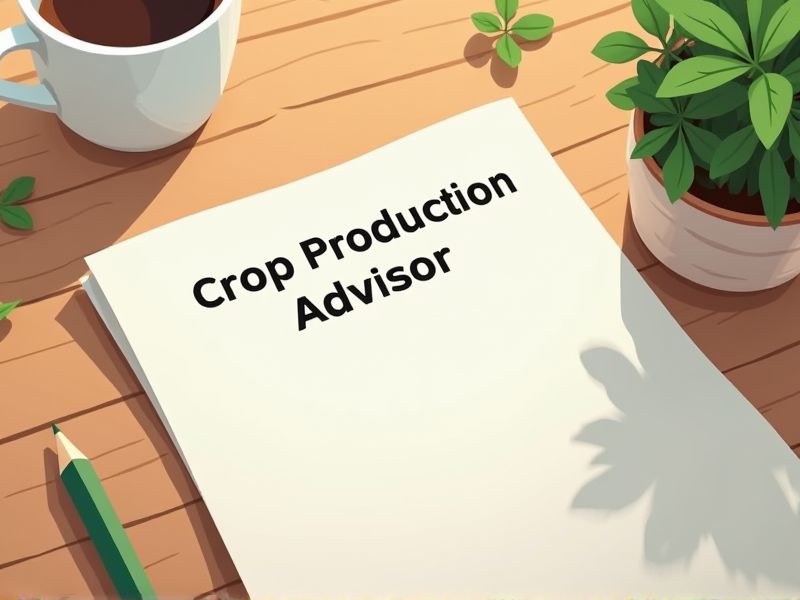
In the agricultural sector, the role of a Crop Production Advisor is crucial for optimizing yield and ensuring sustainable farming practices. Certifications equip advisors with the necessary expertise to effectively manage pest control, nutrient management, and crop health. Regulatory bodies and market demands often require proof of specialized knowledge to maintain industry standards and consumer trust. These are some essential certifications a Crop Production Advisor may need.
Certified Crop Adviser (CCA)
Certified Crop Advisers possess specialized knowledge that helps optimize crop yields through effective nutrient management. Their expertise leads to sustainable agricultural practices, reducing environmental impact and conserving resources. By staying updated on the latest agricultural techniques, CCAs enhance pest management strategies, which increases crop health. Farmers benefit from the guidance of CCAs by improving profitability due to informed decision-making and risk management.
Certified Professional Agronomist (CPA)
Certified Professional Agronomists possess in-depth scientific knowledge of soil health and plant growth, directly influencing effective crop production strategies. Their expertise leads to optimized resource management, reducing input costs and improving yield efficiency. They emphasize sustainable practices, which can mitigate the environmental impact of agriculture activities. Their guidance on pest and disease management diminishes crop losses, enhancing food security.
Pesticide Applicator Certification
Crop Production Advisors need Pesticide Applicator Certification to ensure the safe and effective use of chemical products, reducing risks to both the environment and human health. Certification mandates that advisors possess extensive knowledge of specific pesticides and their application techniques, which helps to maximize crop yield while minimizing negative impacts. Through certification, advisors are equipped to comply with local and federal regulations, preventing potential legal consequences. Certification also builds trust with clients who rely on expert guidance for sustainable agricultural practices.
Nutrient Management Specialist Certification
Nutrient Management Specialist Certification enhances the advisor's ability to create effective fertilization plans, ensuring optimal crop yields. It ensures that nutrient application complies with environmental regulations, minimizing potential pollution risks. This certification provides updated knowledge on sustainable practices, vital for long-term soil health and productivity. It fosters trust between advisors and farmers, as certified experts are better equipped to support successful agricultural operations.
Certified Professional Soil Scientist (CPSS)
Ensuring optimal soil health and fertility requires a Certified Professional Soil Scientist (CPSS), as they provide detailed soil assessments critical for effective crop growth. Their expertise guides the selection of appropriate soil amendments, boosting crop yield and sustainability. CPSS professionals assess potential soil contaminants and erosion risks, protecting crops and maintaining environmental standards. By interpreting complex soil data, they assist crop production advisors in making informed decisions that support long-term agricultural success.
Precision Agriculture Certification
Precision Agriculture Certification ensures that a Crop Production Advisor is equipped with knowledge of advanced farming technologies. This expertise enables advisors to optimize resource use, impacting crop yields positively. Certified advisors can better interpret data from precision tools, helping to prevent disease and pest outbreaks. Certification supports alignment with sustainable practices, which responds to the increasing demand for environmentally conscious agricultural solutions.
Organic Crop Production Certification
Organic Crop Production Certification provides the necessary framework for advisors to guide farmers in sustainable practices. This certification ensures that advisors are equipped with knowledge about avoiding synthetic chemicals, which is essential for maintaining soil health and biodiversity. Farmers seek expert guidance to achieve organic standards, making certified advisors invaluable to the sector's credibility. Compliance with this certification enhances trust between advisors, farmers, and consumers who prioritize organic produce.
Certified Irrigation Manager (CIM)
The Certified Irrigation Manager (CIM) designation ensures that Crop Production Advisors can effectively manage water resources, which enhances crop yields and sustainability. Enhanced irrigation strategies reduce the risk of crop failure due to water stress, ultimately improving agricultural productivity. With precise irrigation management, there is decreased runoff and soil erosion, ensuring long-term soil health and conservation. Water use efficiency achieved by CIM contributes to cost savings and environmental responsibility, pivotal for a sustainable farming future.
Climate-Smart Agriculture Certification
Climate-Smart Agriculture Certification enhances a Crop Production Advisor's ability to recommend sustainable techniques, reducing the environmental impact of farming practices. More informed advisors can guide farmers in adopting practices that increase resilience to climate change, leading to improved food security. Certification provides crucial knowledge on reducing greenhouse gas emissions within agricultural systems, a critical factor in addressing global climate issues. Staying certified ensures advisors are updated with current sustainable practices, meeting the increasing demand for eco-friendly products among consumers.
Integrated Pest Management (IPM) Certification
Implementing an IPM Certification program for Crop Production Advisors results in a more systematic approach to pest management, reducing reliance on chemical pesticides and promoting sustainable agriculture. Improved knowledge and skills from the certification process prevent crop damage and loss, subsequently increasing agricultural yield and profitability for farmers. The certification enhances consumer trust by supporting safe and environmentally friendly practices in crop management. Regulatory compliance often mandates IPM practices, and certification helps advisors align with these legal frameworks, minimizing ecological impact.
Summary
With certifications, you enhance your credibility, leading to increased trust from farmers and clients. Certified knowledge allows you to provide more accurate and effective recommendations, improving crop yields. Certification equips you with the latest agricultural practices and technologies, increasing your competitive edge. Certification often results in better career prospects and potential for higher earnings in the industry.
